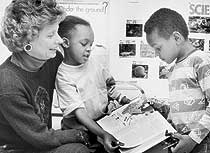
|
|
Senator
Allan Spear '58 | Janet
Denison Howell '66 | Charlene
Drew Jarvis '62
"Whatever it takes, I'm going to be making laws here someday!"
"I was trying to tell the Courts of Justice Committee in Richmond what we needed to make the new system work," recalls Howell, then an assistant to a member of the House of Delegates. "Nobody was listening to me, and in the middle of it, I heard this male voice say, 'Why do these women need child support? They all get alimony.'" Then and there, Howell decided: "Whatever it takes, I'm going to be making laws here someday." No stranger to politics, Howell had majored in government, then spent 15 years working as a community volunteer on dozens of causes--like establishing a homeless shelter in Reston, Virginia, where she lives with her husband, classmate and economist Hunt Howell, and their two sons. "I realized that for everything I was trying to accomplish, I had to go to elected officials for help," she says. "It slowly occurred to me that I could be an elected official." In 1991, she won an open seat in the Virginia State Senate, a Democrat elected in a Republican enclave. Re-elected twice, Howell, a moderate to liberal on most topics, is known for her tenacious attempts to pass gun-control legislation in her conservative, largely pro-gun state, and for her defense of abortion rights, which are frequently assaulted by the Virginia Assembly. But rather than discouraged, Howell is invigorated by the opposition. "I'm a little unusual in that I am satisfied with incremental change," she muses. "I've learned how important it is to stop nonsense, not only to make things better, but to keep them from getting worse. Sometimes maintaining the status quo is a success." One of a handful of women in the Senate, Howell has also crafted bills to overhaul Virginia's domestic- abuse and stalking laws. And as vice chair of the Commission on the Prevention of Sexual Assault from 1994 to 1999, she helped draft Virginia's Megan's Law, which requires the state to identify sex offenders to the public via an Internet registry site. "It's a tough balancing act between the rights of the people who've been convicted and the rights of children to know [about these people] and be protected," she says. "We found a balance by making it a crime to harass or intimidate anyone listed on the Internet for this." While on the commission, she made national headlines when she told a reporter she'd been sexually assaulted by a stranger outside her grammar school when she was 6. Although the media portrayed her as a woman whose own experience led to her crusade, the truth was more complicated. "I did not want to be involved in the sexual violence issue," Howell recalls. "I didn't know if I was strong enough to deal with it impartially." It was pure coincidence that she was appointed to the commission by a senior senator who believed there should be a female voice in drafting laws that would affect women. She felt responsible for providing that voice. But she dreaded wading into a subject she'd put firmly behind her. Initially, Howell didn't tell anyone about her experience. But gradually she felt compelled to reveal it. "I was asking other people who'd been victims to come forward and give me advice on the law," she says. "How could I be so hypocritical as not to say that it had happened to me?" Howell even invited a convicted pedophile into her home. ("My husband really thought I'd lost it that time," she recalls with a laugh.) She quizzed the man on what he thought should be in the law and how society could help him avoid committing his crime again. Her work has helped others and empowered her. "It helped me realize that it wasn't my fault. I've gotten a lot of satisfaction working so that it doesn't happen to other kids," she says. "And now I'm the one putting these offenders on the Internet."
<<<
Previous
Page___________Next
Page >>>
|
 Janet
Denison Howell '66 was
testifying before a Virginia House of Delegates committee about
improving Virginia's social- services department, which was mishandling
the state child- support system, when she realized she had to
get into politics.
Janet
Denison Howell '66 was
testifying before a Virginia House of Delegates committee about
improving Virginia's social- services department, which was mishandling
the state child- support system, when she realized she had to
get into politics.